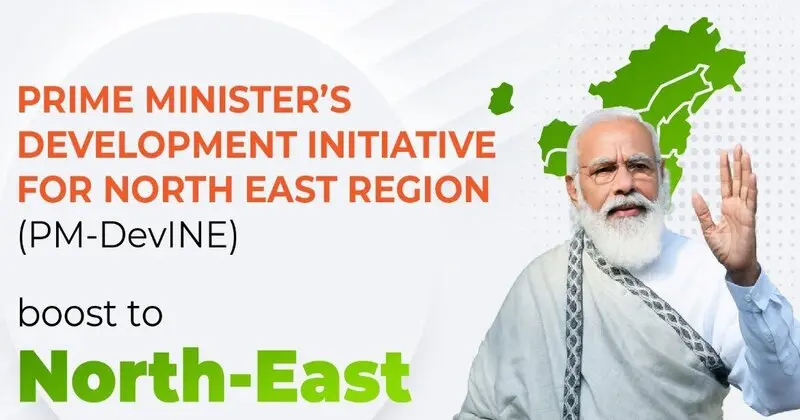Context-
The Prime Minister's Development Initiative for North Eastern Region (PM-DevINE) scheme was launched by the Government of India in 2022 with a financial outlay of Rs 6,600 crore over four years (2022–23 to 2025–26).
Background
This initiative aims to address various developmental challenges in the North East Region (NER) of India, encompassing infrastructure development, social welfare, livelihood enhancement, and bridging developmental gaps across sectors. While PM-DevINE shares similarities with existing schemes and projects under the North Eastern Council (NEC), its administrative framework and implementation mechanisms have been structured differently, with the Department for Development of North Eastern Region (DONER) assuming a central role.
Comparison with the North Eastern Council (NEC)
The North Eastern Council (NEC) has long been instrumental in coordinating and implementing developmental initiatives in the NER. Established in 1971, the NEC operates under a statutory framework and has played a significant role in addressing the region's developmental needs. However, the administrative processes involved in conceiving, sanctioning, and funding schemes and projects under the NEC differ from those under PM-DevINE. While the NEC's mandate encompasses various functional areas relevant to the NER's development, the administrative mechanisms under PM-DevINE have been streamlined to involve direct oversight and control by the DONER.
Administrative Changes Under PM-DevINE
Under PM-DevINE, the DONER assumes direct responsibility for conceiving, sanctioning, funding, and monitoring schemes and projects aimed at the NER's development. This marks a departure from the previous administrative setup where the NEC played a more central role in coordinating and executing developmental initiatives. The establishment of an Empowered Inter-Ministerial Committee (EIMC), comprising representatives from relevant ministries and agencies, underscores the collaborative approach adopted under PM-DevINE.
Empowering the North Eastern Council
Despite the establishment of PM-DevINE, there remains a case for empowering the NEC and aligning its functions with the objectives of PM-DevINE. Given the NEC's historical role and expertise in addressing the NER's developmental challenges, empowering the Council to oversee and implement PM-DevINE schemes and projects could enhance efficiency and ensure better coordination with the states in the region. This would entail granting the NEC greater autonomy and authority in administering PM-DevINE initiatives, with the Secretary, NEC, leading the empowered committee responsible for project conception, sanctioning, funding, and monitoring.
Conditionalities and Financial Controls
PM-DevINE imposes certain conditionalities and financial controls to ensure prudent financial management and adherence to overarching national priorities. Schemes and projects under PM-DevINE must align with the 'Gatishakti' initiative, adhere to prescribed financial thresholds, and be accommodated within the approved budgetary outlay. While these controls are essential for maintaining fiscal discipline and ensuring effective utilization of resources, they may pose challenges for states in implementing projects within their purview.
Addressing Socio-Economic and Security Imperatives
The NER faces unique socio-economic and security challenges that necessitate a holistic approach to development. Involvement of the Ministry of Home Affairs is crucial to address security concerns and promote stability in the region. Maintaining a linkage between PM-DevINE and the Union Home Ministry can ensure that developmental initiatives are aligned with security imperatives, fostering sustainable growth and peace in the region.
Ensuring Maintenance and Sustainability
A critical aspect of development initiatives is ensuring the long-term maintenance and sustainability of infrastructure projects. PM-DevINE mandates that scheme proposals include provisions for operation and maintenance costs for four years post-completion. However, inadequate financial resources for maintenance remain a concern, reminiscent of challenges faced by states in maintaining NEC projects. Establishing a mechanism for central funding through the NEC could address this issue, ensuring timely and adequate maintenance of PM-DevINE projects.
Exploring Financial Mechanisms
The Sixteenth Finance Commission presents an opportunity for NER states to advocate for additional funding mechanisms to support maintenance and sustainability of PM-DevINE projects. Channeling maintenance funds through the NEC, with greater involvement of NER states, can promote cooperative federalism and ensure effective utilization of resources. By leveraging central funding mechanisms, the NER can overcome financial constraints and achieve sustained development outcomes.
Conclusion
In conclusion, PM-DevINE represents a significant step towards addressing developmental challenges in the North Eastern Region. While the initiative shares objectives with existing schemes under the NEC, its administrative framework and implementation mechanisms signal a departure from the status quo. Empowering the NEC and fostering greater collaboration between central and state agencies can enhance the effectiveness and sustainability of PM-DevINE initiatives. By addressing socio-economic, security, and financial imperatives, PM-DevINE has the potential to catalyze transformative change and foster inclusive growth in the North East.
|
Probable Questions for the UPSC Mains Exam 1. Discuss the key administrative changes and structural differences between the Prime Minister's Development Initiative for the North Eastern Region (PM-DevINE) and the existing North Eastern Council (NEC) in addressing developmental challenges in the North Eastern Region (NER) of India. (10 Marks, 150 Words) 2. How does the Prime Minister's Development Initiative for North Eastern Region (PM-DevINE) aim to address the socio-economic and security imperatives of the North Eastern Region (NER)? Discuss the significance of empowering the North Eastern Council (NEC) and exploring financial mechanisms, including involvement with the Sixteenth Finance Commission, in ensuring the sustainability and effectiveness of PM-DevINE projects. (15 Marks, 250 Words) |
Source- India Foundation








